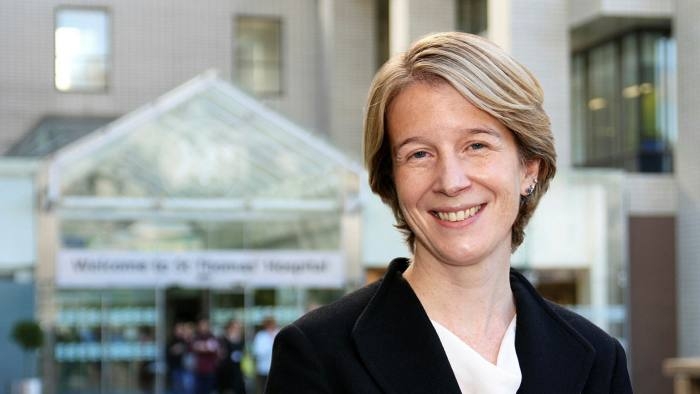‘Deputy succeeds boss’ might not normally feel like a ‘hold the front page’ type headline. But the announcement that Amanda Pritchard is the new head of NHS England – replacing Simon Stevens – reveals a lot about the state of the NHS and the future direction of the health service.
Firstly, the process. Despite concerns that the race to succeed Stevens would be politicised, Pritchard’s appointment (which I revealed on Thursday, thanks to a spot of digital and logistical sleuthing) is understood to have been wholly free of political nudging.
Some of the credit for this goes to Number 10 health advisors and some to Lord David Prior, NHS England’s chair and a former Conservative MP. That Pritchard was appointed without political interference matters a great deal. The NHS grapevine is a powerful thing, and the understanding that Pritchard won the role fair and square will be good for her reputation and status within and beyond the service. The 14 hours of interviews did, however, include psychometric tests and assessments of shortlisted candidates’ ‘dark side’ traits: something with a scientific evidence base similar to homeopathy or phrenology.
The NHS will be pleased to see ‘one of its own’ get the job. Almost all of Amanda Pritchard’s career has been in the NHS, after she came through the highly regarded NHS Management Trainee Scheme.
The NHS will be pleased to see ‘one of its own’ get the job
This is not to imply that she does not ‘get’ politics (an area in which Simon Stevens was a master). She spent a year leading the health team in the Cabinet Office delivery unit from 2004 to 2005, and has experience of navigating the political and Treasury landscape.
The other shortlisted candidates are also worth mentioning. It has been wrongly assumed by (or perhaps briefed to) some national newspapers that the new Health Secretary, Sajid Javid, was responsible for removing the former Test and Trace boss Dido Harding from the long and shortlist to replace Stevens.
This is incorrect. Sources adjacent to the interview process and panel are emphatic that they decided Harding’s candidacy should not proceed. This should spell an end to her time in NHS roles. Baroness Harding is known to have made it clear to the NHS Improvement board that she only wanted to be chief executive of the NHS. It would now be neither credible nor tenable for her to seek to return to another NHS role.
Of the shortlisted candidates, it was widely believed that the other front-runner, along with Ms Pritchard, was the author, KPMG head of health and ex-NHS director Dr Mark Britnell. (Other candidates included Leeds council CEO, Tom Riordan, an overseas healthcare CEO, and Amazon’s Douglas Gurr, none of whom had NHS backgrounds.)
Britnell has many fans from his time in the NHS. He was the youngest ever hospital chief executive, spent time as Midlands regional chief, and then served as the department of health’s director-general of commissioning (where he was asked to ‘make commissioning sexy’ by then-NHS chief Sir David Nicholson). Although naturally disappointed to miss out on the role, Britnell is known to regard Pritchard as a very fine candidate, and he is privately urging colleagues and friends across the service to support her fully in addressing the considerable challenges facing the NHS.
Amanda Pritchard is very much her own person. She has a strong reputation for competence, detail and delivery, and she is also fairly universally liked (something that is by no means a given in senior NHS management). She has made, so far, few enemies. Glamour magazine even named her as one of their ‘15 women we predict will rule the world’ in 2016. She is also unlikely to want or try to be ‘Simon Stevens mark II’.
Stevens maximised the independence of NHS England after the Lansley reforms to subtly subvert their focus on NHS competition. His confident outbursts and decisive public interventions – such as his call for an NHS Brexit bonus – allowed him to win funding increases from the Treasury and are known to have discomforted cabinet ministers past and present. (They even led to Theresa May’s special advisors Fiona Hill and Nick Timothy comically briefing against Stevens back in 2017 – attacks he swatted aside with ease.)
This ministerial discomfort with Stevens’ autonomy directly led to the new Health Bill before Parliament, which considerably increases ministerial powers of direction over the NHS. That is what Yes, Minister’s Sir Humphrey Appleby might term ‘a courageous move’, given the enormous backlogs, shortages of trained staff and capital and maintenance backlog funding facing the NHS. Ministers may take back control of the NHS, but they will also be taking control again of the NHS’s problems. One wonders if ministers have yet realised this.
If the legislation passes as currently proposed, this will open up an interesting space for Amanda Pritchard. She will need to be an effective advocate for the NHS and also for social care reform – which tends to get stuck in the long grass. But if funding arguments do not go her way, she will be able to point clearly to the government’s own choices in removing NHS England’s autonomy. Again, it is unclear whether this penny has dropped yet with politicians.
There nonetheless remains a high risk of the government blaming the NHS England boss should waiting times remain stubbornly high (which on the current funding trajectory, is likely to be the case). But there is an approach that Pritchard might want to consider. She could get the three major health thinktanks, possibly along with the independent Institute for Fiscal Studies, to publicly put a definitive number on the cost and timescale of addressing the NHS’s backlogs and shortages. This would maximise pressure on the Treasury and help insulate Pritchard’s position.
Either way, one can only wish Pritchard the best of luck in her new job: she is certainly going to need it.






Comments